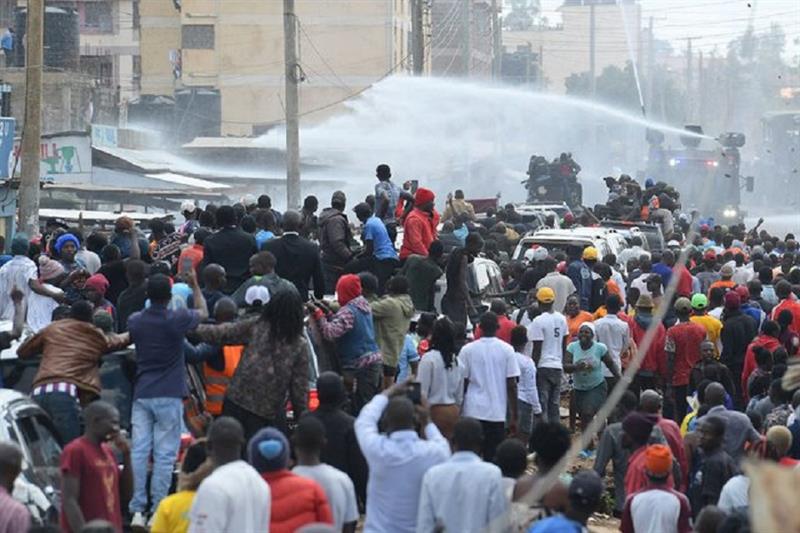
Anti-riot police use a water canon to disperse supporters of opposition leader Raila Odinga, who claims the last Kenyan presidential election was stolen from him and blames the government for the hike of living costs in Nairobi on March 27, 2023. ( AFP)
The protesters defied a warning by the Inspector General of Police Japhet Koome that the demonstrations in Nairobi and the western city of Kisumu, an Odinga stronghold, were "illegal".
The opposition stalwart has called for protests every Monday and Thursday against the government of President William Ruto, who he claims stole last year's election, and is failing to address the high cost of living.
Security was tight with riot police deployed in strategic points around Nairobi after last week's demonstrations turned violent in some neighbourhoods.
Tear gas and water cannon were deployed as Odinga's convoy moved through a congested slum of the capital, sending people scattering, with police also firing canisters at cars carrying journalists.
"How many support the demonstrations? How many here are saying the price of basic commodities should go down, maize flour should go down, cooking oil, school fees and other commodities must come down?" Odinga told the crowds thronging his vehicle
Police also clashed with stone-throwing demonstrators in the city's largest slum Kibera, where protesters set tyres ablaze while gangs attacked journalists.
And in Kisumu, where a university student was killed in the protests last week, police used tear gas to disperse the crowds.
31 officers were injured in last week's running battles between riot police and demonstrators, and more than 200 people were arrested, including several senior opposition politicians.
Odinga's convoy was also hit in last week's protests.
The interior ministry warned on Sunday that law enforcement agencies "shall not tolerate the reported plans to repeat the violent, chaotic and economically disruptive protests".
Mother of all demonstrations
The demonstrations are the first major outbreak of political unrest since Ruto took office more than six months ago after defeating Odinga in an election his rival claims was "stolen".
Despite the police ban, Odinga called Sunday on Kenyans to join what he has described as "the mother of all demonstrations".
"I want to tell Mr Ruto and the IG Koome that we are not going to be intimidated," he said. "We are not going to fear tear gas and police."
Nairobi residents were wary after the previous violence.
"I may have to close too because I have seen most of my neighbours are closed," said Mercy Wangare, an Mpesa (mobile money) kiosk attendant at an electronics shop.
"I am just weighing the situation before I decide because the sight of these policemen patrolling around is a sign that it may not end up well."
Ruto, who is currently on a four-day trip to Germany and Belgium, has urged his rival to halt the action.
"I am telling Raila Odinga that if he has a problem with me, he should face me and stop terrorising the country," he said Thursday.
"Stop paralysing the businesses of mama mboga, matatu and other Kenyans," he said, referring to women stallholders and private minibus operators.
Sleep hungry
Many Kenyans are struggling to put food on the table, battling high prices for basic goods as well as a plunging local currency and a record drought that has left millions hungry.
"If the leaders don't talk, it is us who are affected. They are rich people, it is us who will sleep hungry," motorcycle taxi driver Collins Kibe told AFP.
During the election campaign, Ruto portrayed himself as champion of the downtrodden and vowed to improve the lot of ordinary Kenyans.
But critics say he has broken several campaign promises and has removed subsidies for fuel and maize flour -- a dietary staple.
Kenya's energy regulatory body has also announced a hike in electricity prices from April, despite Ruto insisting in January there would be no such increase.
Last week's protests proved costly, with Deputy President Rigathi Gachagua saying the economy had lost at least $15 million.
Short link: